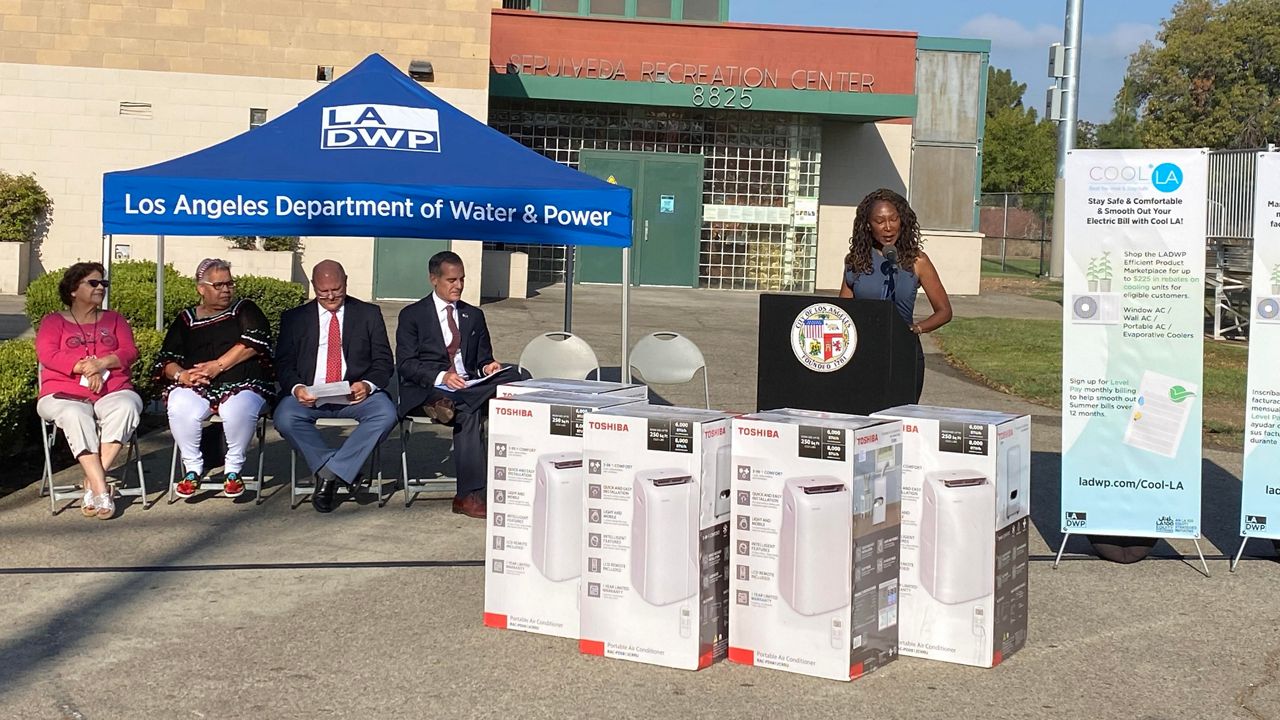LOS ANGELES — Customers of the Los Angeles Department of Water and Power, who fear their electricity bills from this month’s heat wave, will have a new option to pay them. Starting Monday, LADWP is launching a new Level Pay system available to all customers that takes a year’s worth of utility bills and spreads them out evenly over a 12-month period.
“We don’t need another heat storm like the one that we just experienced to know that extreme temperatures and life-threatening heat [are] part of the new normal. To be clear, the climate has already changed,” LADWP Board of Commissioners President Cynthia McClain-Hill said Friday at the Mid-Valley Senior Center in Panorama City, where local seniors received free portable air conditioners as part of the city’s new Cool LA program.
Designed to combat the health impacts of days that exceed 90 degrees, LADWP first proposed its Cool LA initiative in July to help Angelenos stay cool without fearing the financial repercussions of buying an AC unit or paying for the AC they already have.
The two main tenets of the program are the Level Pay system, launching Monday, and an expanded rebate that allows Angelenos to buy or replace various types of air conditioning units at a reduced cost. LADWP already had a $75 incentive to help people purchase air conditioning, but it tripled the rebate to $225 for income-eligible customers with Cool LA.
In a few weeks, that rebate will also be available at the point of purchase, so customers do not need to apply for it through the LADWP website. The rebates are applicable to window, wall and portable AC units, as well as evaporative coolers.
LADWP bills are often highest during the summer months when temperatures are hotter, prompting people to crank their air conditioning. Through the Cool LA Level Pay system, LA residents can manage those higher power costs by signing up for monthly bills that evenly distribute their payments over an entire year so each payment is the same.
“We believe this will provide the opportunity to help everyone manage budgets better,” McClain-Hill said. “This is not just a quality-of-life issue. It is literally life and death. We know some of the most at-risk Angelenos don’t own and can’t afford to have an air conditioner.”
Extreme heat waves cause five times more deaths than any other climate hazard in the city, according to the LA Climate Emergency Mobilization Office. Already a deadly public health threat, it’s expected to get worse because of climate change, which increases the frequency and intensity of extreme heat events characterized by weather that is much hotter than average.
Mortality increases 8% on the hottest days during an average Los Angeles summer, according to health officials. Consecutive days of intense heat cause 30% more deaths. Seniors, children and individuals with chronic medical conditions are most at risk, as are individuals in low-income communities, Blacks, Latinos and outdoor workers.
McClain-Hill said room air conditioners are a good option to immediately bring down indoor temperatures on hot days in homes that lack central air conditioning or window-mounted units. Even so, low-income and elderly LADWP customers who have air conditioning often hesitate to use it because of the cost.
Many parts of Los Angeles, including the San Fernando Valley and Central and South LA, face worsening heat emergencies due in part to a lack of tree cover that makes those parts of the city even hotter.
LA Mayor Eric Garcetti said the city has earmarked nearly $2 million for heat mitigation and home improvements for low-income residents, including the AC rebate program. It’s allocated an additional $4 million from its general fund for 60 miles of new cool pavement and $2 million to expand tree canopy.
“We might be paving and painting your street. We might be giving you an air conditioning unit, and we might be planting trees all on the same blocks,” Garcetti said Friday. “Resilience means responding now to the threats that we face, not waiting for tomorrow or saying one day in 50 years, we will have confronted climate change. People need relief today.”
EDITOR'S NOTE: The story was updated to clarify the air conditioner rebate is for income-eligible customers. (Sept. 19, 2022)



